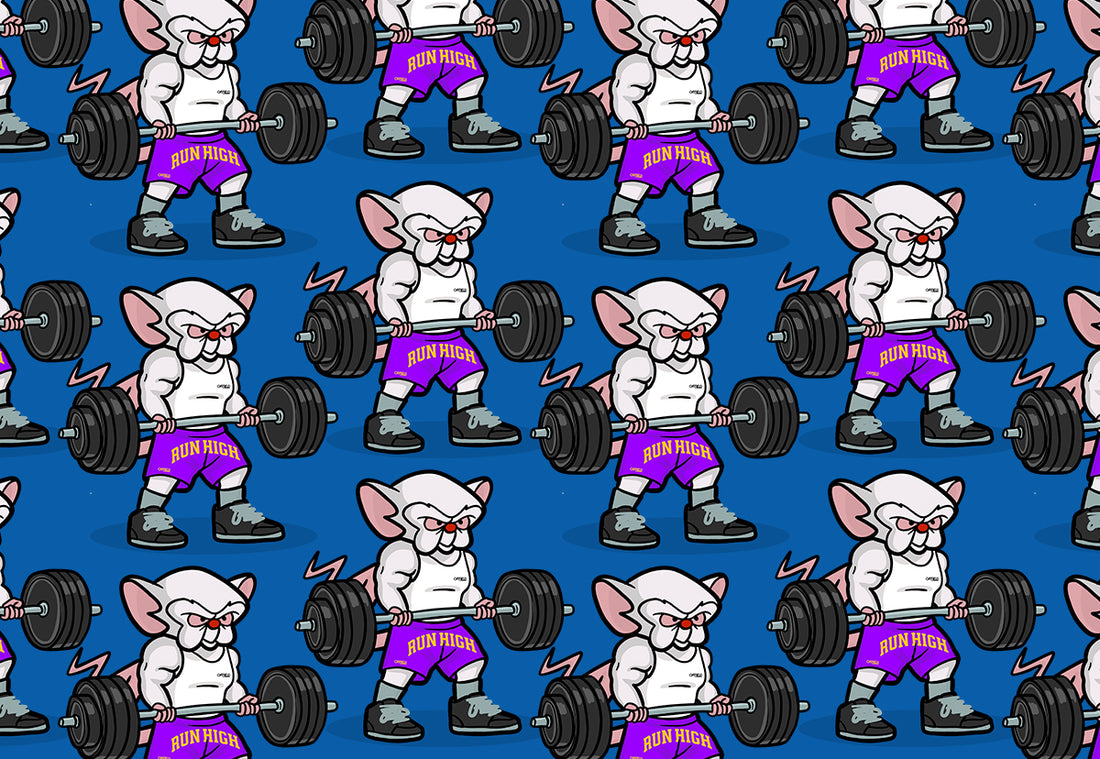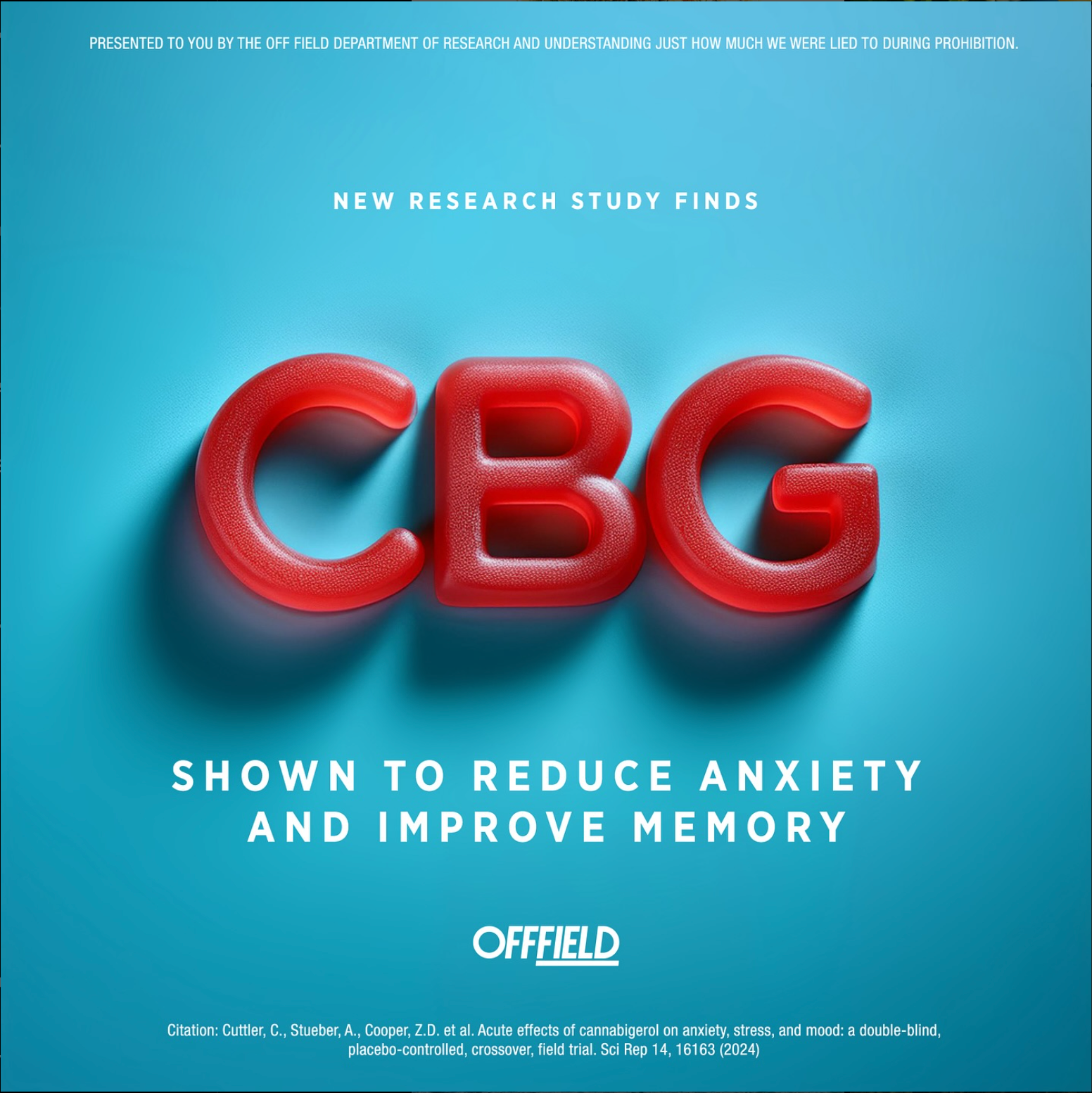
Low Dose THC Found to Improve Brain Health
Imagine this: Your experience with cannabis is way different then what older generations told you it would be like.
It turns out, you’re not alone. A big new study found that people who use cannabis are more likely to be active, especially in states where it’s totally legal.
Wait, What Was in this Study?
Researchers looked at health data from thousands of adults across the U.S. between 2016 and 2022. They wanted to know: Is there any connection between cannabis use and physical activity?
Short answer: Yep. And it’s a good one.
5 Fast Facts from the Study
🧠 More Movement
From 2016 to 2022, more people started getting active AND more people started using cannabis. The two went hand in hand.
🏃 Cannabis Users Were More Likely to Exercise
People who used cannabis were 24% more likely to engage in physical activity compared to non-users.
🌱 Legal States = More Movement
The connection was even stronger in states with legal recreational cannabis. Users there were 47% more likely to be active.
💪 Chronic Illness? Cannabis Might Help
Usually, people with medical conditions are less active. But among those who used cannabis, that drop-off wasn’t as big.
📈 This Isn’t a Fluke
Researchers controlled for age, income, and health—and the link still showed up.
Quotes from the Study (with Human Translation)
"Cannabis use was associated with greater odds of physical activity."
Translation: People who use weed move more.
"The association was stronger in recreational-legal states."
Translation: When cannabis is easier to get, people are even more likely to be active.
"Among individuals with chronic conditions... cannabis use may mitigate this disparity."
Translation: Cannabis might help folks with pain or health challenges get back out there.
So What Does This Mean for You?
Here’s the deal: OFFFIELD was created on the idea that movement can be joyful, even euphoric, and that cannabinoids, when used intentionally, can support that feeling.
This study? It’s a giant green checkmark on what we’ve believed from the beginning.
With OFFFIELD, you can:
Run Happy : not punishing.
Train Focused : not foggy.
Recover Deeply : not sluggish.
Enjoy the Process : not just the progress.
A Note to the Skeptics (or Your Aunt Becky Who Thinks Cannabis = Couch)
Science is evolving. What we’re seeing now is that cannabis isn’t just about chilling on the couch. It’s showing up in races, rides, hikes, and runs.
And with the right dose, the right blend, and the right mindset? It’s not a shortcut, it’s a tool for better training, better recovery, and better connection to your body.
Try It for Yourself
If you're 21+ and live in the U.S., OFFFIELD is here to help you move smarter and smile bigger. We’re science-backed, athlete-approved, and here to bring joy to every workout, one gummy, sip, or mile at a time.
Happy trails. And hey, move how you like.

Author’s Note: At OFFFIELD, we are focused on cannabinoid research and developing products formulated for exercise and recovery. Cannabis is a broad term encompassing thousands of products and substances that can be healthy, unhealthy, or anything in between. We share these new findings regarding cannabis because it is important to highlight the propaganda and false information shared with the general public, which creates a stigma around a plant that has the potential to help people when used responsibly by both companies and individuals.
Introduction
For generations, the “lazy stoner” trope has dominated pop culture. We’ve all seen the caricature: a cannabis consumer glued to the couch, never quite making it outside for a run or even a brisk walk. Yet a growing body of research is challenging this outdated image, both through anatomical understanding and statistical significance. Most recently, a federally funded study published in the journal Addictive Behaviors found that on days people used cannabis, they actually got more moderate-to-vigorous physical activity (MVPA). That’s a revelation for anyone who assumed cannabis consumption went hand-in-hand with total inactivity.
Conducted by a team of ten researchers from universities across the U.S.—including the University of Oklahoma Health Sciences, the University of Texas School of Public Health, the University of Michigan, Texas A&M-Commerce, Louisiana State University Health Science Center, the Georgia Institute of Technology, and the University of Colorado Boulder—the study analyzed the daily behaviors of 98 adults over a four-week period. Here’s how it worked: Each participant, who had used cannabis at least once during that month, completed smartphone-based surveys about their day-to-day physical activity. The data revealed a same-day association between cannabis use and increased time spent engaging in exercise—findings that fly in the face of lingering stereotypes about cannabis users being inherently lazy.
How the Study Worked
Participants & Data Collection
For inclusion in the study, participants had to be at least 18 years old and must have used cannabis on at least one day out of the 28-day tracking period. By focusing on people who already incorporate cannabis into their lifestyles, the researchers were able to observe how usage correlated with other behaviors within the same individuals. This approach reduces the possibility that preexisting lifestyle differences between cannabis users and non-users would skew the results.
The team employed a method called Ecological Momentary Assessment (EMA), which uses smartphone-based surveys to collect data in near real-time. Instead of asking participants to remember their habits for the entire past month, the study pinged them on a daily basis, capturing more accurate, detailed snapshots of their behavior. Participants were asked:
Whether they had used cannabis in the previous 24 hours.
How many minutes of vigorous physical activity they had engaged in during that same period.
By comparing data from days when participants reported using cannabis to days they did not, the study was able to isolate a same-day correlation between cannabis consumption and changes in exercise levels.
Busting the “Lazy Stoner” Myth
Positive Association with Exercise
The headline takeaway is straightforward: cannabis use was linked with higher levels of moderate-to-vigorous physical activity. When participants consumed marijuana, they also recorded more minutes spent on activities like running, aerobics, or other forms of intense exercise. This complements research showing that certain cannabis consumers—far from being sedentary—often exhibit equal or higher activity levels than their non-using counterparts.
The authors wrote that their findings “aligned with our hypothesis and prior cross-sectional observations that people who use cannabis (vs. non-users) tend to report more minutes of weekly [physical activity, or PA] and have higher accelerometer-measured light PA and MVPA.” Put simply, these results reinforce the emerging scientific consensus that cannabis consumers can be just as active—and in some cases more active—than the general population.
Potential Reasons Behind the Trend
While the study didn’t strive to prove precisely why cannabis users might exercise more, it highlights a few theoretical mechanisms. For one, cannabis interacts with the body’s endocannabinoid and dopaminergic systems, potentially increasing the sense of psychological reward from activities like running or weightlifting. Users often report that cannabis can:
Increase Enjoyment – A tough workout might feel more pleasurable, helping people push through routines they might otherwise avoid.
Enhance Motivation – The elevated mood and focus some strains provide could help users stay consistent with their exercise goals.
Facilitate Recovery – Many athletes cite cannabis as a tool for easing soreness, reducing inflammation, or simply promoting relaxation after a strenuous session.
These mechanisms remain theoretical, and more targeted studies are needed to confirm them. Still, they offer plausible explanations for why an individual might lace up their sneakers more readily on cannabis-use days.
Supporting Evidence from Other Research
This new study isn’t the only piece of evidence upending the lazy stoner myth. Multiple papers over the past few years have shown similar links between cannabis use and physical activity:
Medical Cannabis and Chronic Conditions
Research on medical marijuana patients with conditions like arthritis or chronic pain suggests that cannabis can reduce discomfort, enabling them to move or exercise more frequently.
Population Surveys
Large-scale surveys in regions with legal medical or recreational cannabis often reveal populations that are at least as active—if not more active—than those in jurisdictions where cannabis remains prohibited.
Accelerometer Data
Wrist-worn accelerometers, used in certain studies, show that cannabis users do not necessarily become more sedentary. In fact, some data indicate a modest increase in light or moderate physical activity after consumption.
These findings collectively challenge long-standing views on cannabis, demonstrating that its impact can vary widely, often shaped by individual physiology and context.
A Note on Alcohol and Cigarettes
While this study’s standout message is that cannabis was linked to more exercise, it also found that participants who used cannabis on a given day tended to use alcohol or cigarettes more often. From an OFFFIELD perspective—where the focus is on movement, wellness, and community—this aspect is less central to our mission. However, if you or someone you know suffers from alcohol or tobacco addiction, it may be worthwhile to consult the full study or seek professional guidance to understand how these factors might intersect.
What’s Next: The Future of Cannabis and Exercise Research
As legalization expands, researchers have more opportunities to examine cannabis’s broader impacts. With stigma receding, participants are more open to discussing their use, leading to deeper insights on how cannabis might complement daily movement and fitness.
Detailed Comparisons
Future work could compare active cannabis users to people who never consume cannabis, determining whether adopting cannabis can spur a more active lifestyle or if those who are already active simply gravitate toward it.
Refining Dose and Strain
Researchers could look at which strains or THC/CBD ratios are most conducive to movement or recovery. Pinpointing these details might help people make more informed decisions about integrating cannabis into their exercise routines.
Technological Integration
With wearable tech becoming the norm, studies can leverage real-time biometrics to examine how cannabis influences performance, recovery time, and sleep quality.
Long-Term Outcomes
Does day-to-day motivation translate into tangible health benefits over months or years? Investigating the cumulative effects of cannabis on fitness and wellness is a crucial next step.
Conclusion
The takeaway is clear: cannabis use and an active lifestyle can absolutely go hand in hand. This new research delivers a powerful message that cannabis consumers are not necessarily chained to their couches. Instead, many are hitting the gym, tackling trails, and upending the myth that a puff of smoke equals a day of inactivity.
For those curious about exploring cannabis as part of their fitness journey, the best approach is to stay informed, start low and slow, and pay attention to personal responses. As research accelerates, the old stereotypes are fading, replaced by a more nuanced understanding of how cannabis can intersect with (and sometimes enhance) a healthy, active life.

A study titled “Enjoyment as a Predictor of Exercise Habit, Intention to Continue Exercising, and Exercise Frequency” emphasizes the critical role of exercise enjoyment in promoting long-term adherence to fitness routines. It found that when individuals engage in exercise that aligns with their preferred intensity, they experience higher levels of enjoyment, leading to stronger exercise habits, more frequent workouts, and a greater intention to continue exercising.
Enjoyment acts as a motivating factor, reinforcing positive feelings and commitment to regular exercise. Tailoring workouts to match individual preferences for intensity can enhance the pleasure of exercise, ultimately fostering better engagement and sustainability in health club settings.
Another study found that cannabis may be a primary motivator for people to exercise more often because it elevates their enjoyment. This is a key factor for OFFFIELD, as we are endurance athletes in every sense of the word. We’re not just focused on getting to the finish line quicker in our next marathon, but also getting to the finish line way slower when it comes to life.
All of our products are formulated to activate your Endocannabinoid System, responsible for regulating mood during exercise. Our High Performance line of products, including Energy Gummies and Sports Drinks specifically focus on enjoyment as a key contributor to overall performance enhancement.













